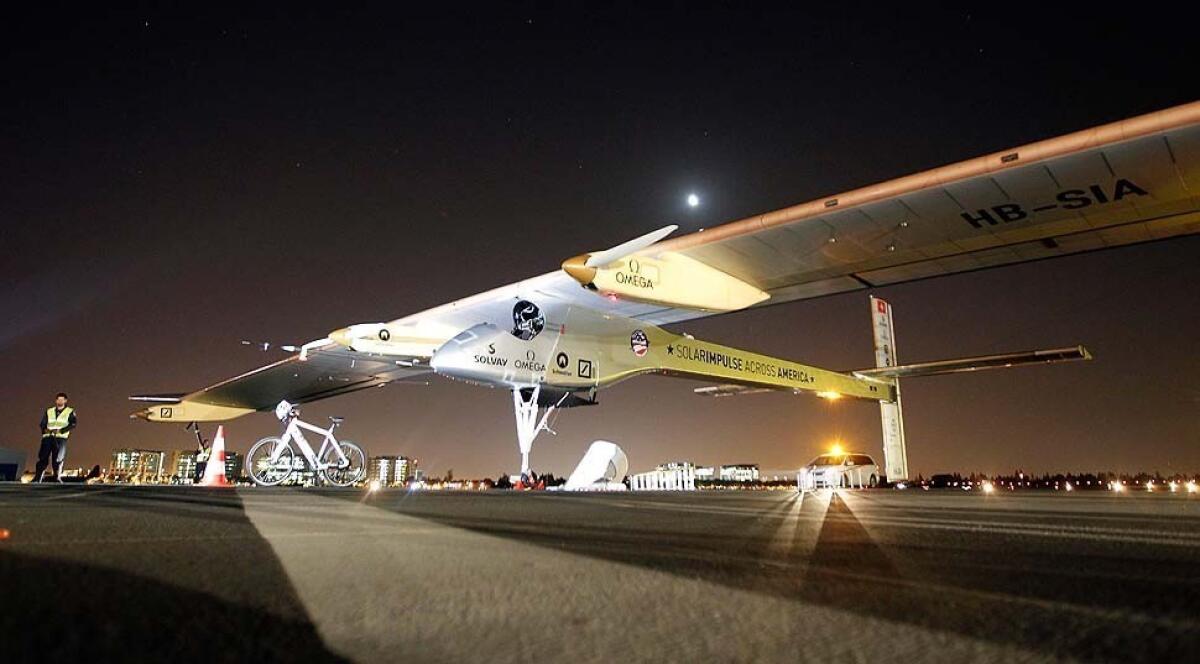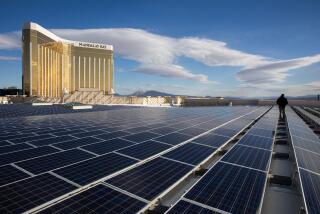Solar airplane begins first leg of trip across America

- Share via
With a wingspan the size of a Boeing Co. 747 jumbo jet, a spindly solar-powered aircraft took to the skies from Moffett Federal Airfield, near San Francisco, on a pioneering flight across the country.
The goal is not speed, because it’s traveling a leisurely 43 mph, or endurance, because it’s making the trip piecemeal. Rather, the goal is to showcase that the trip can be made at all without the use of fuel.
The plane, called Solar Impulse, has an immense 208-foot wing covered with 12,000 solar cells that soak up the sun’s rays and power the plane’s four electric motors while simultaneously charging batteries. That means the plane can keep flying at night.
The first leg is an excruciatingly long 18-hour trip from Moffett Field to Phoenix Sky Harbor International Airport.
“It’s never boring because it’s the most revolutionary airplane that exists -- an airplane that flies day and night with no fuel,” said pilot Bertrand Piccard in an interview as he traveled at 13,000 feet above Northern California.
He took off from Moffett Field at about 6 a.m. Pacific time and is set to land in Phoenix at 1 a.m. Mountain time Saturday.
The solar plane was created Piccard and engineer Andre Borschberg, both Swiss nationals. The two have raised money since 2003 from corporate sponsors and investors, such as Swiss watch manufacturer Omega and Belgian chemicals group Solvay.
Solar Impulse flew for the first time in 2009, soaring 3 feet off the ground for 28 seconds. Work continued and by the next year Solar Impulse made a 26-hour flight in Switzerland on the world’s first solar-powered night flight.
In 2011 the plane made its first international flight from Switzerland to Belgium to France. Last year it took on the first solar-powered intercontinental flight, flying from Europe to North Africa in eight legs over two months.
Now comes the U.S. cross-country voyage that’s expected to take another two months. After Phoenix, there are stops in Dallas, St. Louis, Washington, D.C., and finally at John F. Kennedy International Airport in New York.
The journey is based around raising awareness for the adoption of clean technology. Organizers urge those interested to follow the trip on its website.
Everything on the plane has been designed to save energy. It weighs just 3,527 pounds, due to lightweight structure, flight instrumentation and engines.
Four pods are fixed under the wings. Each contains an electric motor with a maximum power output of 10 horsepower.
Because the aircraft only has one seat, Piccard and Borschberg plan on taking turns flying the plane.
They are planning to fly around the world in a second plane in 2015. That flight will take place over 20 days and 20 nights with several stops.
ALSO:
Supersonic flight brings Virgin Galactic closer to space
Experimental aircraft speeds to more than 3,000 mph in test flight
Investigators sent to Afghan air base where cargo plane crashed [Video]
More to Read
Inside the business of entertainment
The Wide Shot brings you news, analysis and insights on everything from streaming wars to production — and what it all means for the future.
You may occasionally receive promotional content from the Los Angeles Times.











